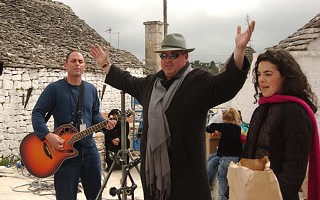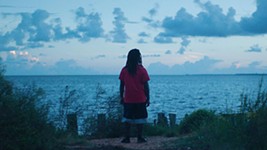God Is My Co-Producer
AFS Documentary Tour presents Audience of One
By Anne S. Lewis, Fri., Jan. 11, 2008

At first blush, one expects that Michael Jacobs' Audience of One will be another doc about what happens when bad things happen to the best-of-intentioned film productions. You know, films of the you-couldn't-make-this-up ilk, like Lost in La Mancha or American Movie. Or those so hilariously made-up, like Christopher Guest's Waiting for Guffman. Stir in the fact that the subject of the film is a charismatic, larger-than-life Pentecostal pastor/hopeful director (his crew, in part, a merry band of the talking-in-tongues faithful) and that the directive to make the "greatest film ever made," a $50 million biblical science-fiction epic, was issued from the lips of none other than J.C. himself, and, well, now we're thinking Hell House, another doc about faith-obsessed, wildly theatrical Pentecostals. Truth is, Jacobs' first feature is all of the above – but a lot more. Masterfully edited by Austin's own Kyle Henry (Room), the camerawork and direction finessed on the scene by Jacobs, essentially working solo, Audience of One manages, as the best docs will, to tell a resonant, character-driven story that makes us think, all the while laughing and cringing.
Which is exactly how Jacobs felt as he accompanied the indomitable and eternally optimistic Richard Gazowsky on his production juggernaut. Jacobs first learned of the church's cinematic aspirations in a SF Weekly article at a time when Jacobs, a self-taught rookie filmmaker who'd previously made a few shorts and done some television work, was looking for a local, low-budget feature with a strong narrative. The scene at Gazowsky's church, Jacobs recalls, "had a very San Francisco quality to it, with lots of misfit-y looking people – a really raw, tangible experience. They do this rock & roll Christian thing for an hour where they dance and pray and get drunk on the Holy Spirit, as they call it, and then the pastor gets up and updates the congregation on the current trials and tribulations of his filmmaking endeavors. I knew immediately this was it!"
Jacobs determined from the outset to give the Pentecostals' story a nonjudgmental, fly-on-the-wall vérité rendition in the best Maysles Brothers tradition and to be completely "transparent with them," as well as careful, and above all, to avoid exploiting them. But he became concerned, as he logged footage and face time with the inexperienced Pentecostals who, with God as their co-producer and despite seriatim production, personnel, and equipment failures – the most breathtaking of which occurred on a big-budget 10-day shoot in Italy with a cast and crew of 40 – remained unfazed and undaunted. Would Jacobs, too, be co-opted by their baseless optimism?
Later, Jacobs became exhausted by their blind faith and "warm and fuzzy" attitudes. "Though that probably made for a better second half of the film," Jacobs explained, "because the viewer is undoubtedly thinking, as well they should, 'Thank God, there's a little distancing going on here,' as they watch the wheels come off the production." It was that pesky journalistic conundrum – that of maintaining some distance from the subject (or at least the illusion of it) – famously described in the Eighties by Janet Malcolm in the pages of The New Yorker: "Spending so much time around them, it was hard to keep that separation between my professional responsibilities and my personal relationship with them. It was a constant balancing – I needed for them to trust me and to feel comfortable with me and yet I was a little bit uncomfortable with that need. ... I couldn't pretend that I agreed with them – so at times when I was having a hard time understanding or believing what they were saying, I had to keep my mouth shut, which though arguably insincere, I guess was part of the filmmaking process."
Austin Chronicle: What was Gazowsky and the church's reaction to the film when they saw it? [The film won a Special Jury Award at South by Southwest 07.]
Michael Jacobs: He loved it. I've heard that he makes all new church members watch the film. ... It was amazing when they saw the film internally at the church and in the secular world at South by Southwest and also at the San Francisco Film Festival that they saw this film through my eyes and the audience's eyes, and even with that kind of reality-checking, they still have this commitment to their pastor's vision, something I don't understand and probably never will. Richard was also, of course, realizing all of the opportunities at hand, as he's been quoted in The Washington Post and on NPR and in The New York Times.
AC: Did you have any sense that Gazowsky or any of the others realized what a disaster the shoot in Italy was? The production pratfalls, the equipment malfunctions, the cheeky talent, the fatal lack of preparation – all of it roll-on-the-ground hilarious, so long as you weren't part of the production.
MJ: I think it was all a big game to him – he's so childlike that he doesn't feel accountable at all. That part of his brain is just not switched on. I've very rarely seen him really rattled. Italy was a further example of this. I'm looking around and seeing the troops a little bit defeated, and I'm seeing some of these people who have worked tirelessly for very little or no money have things go terribly wrong, and I'm looking at their faces and thinking it has to be reaching them that this is not going well at all. But it's amazing – their attitudes – it sounds so clichéd, but they live by the idea that the journey is the reward. And so this journey, though so irresponsible to me, for them is just a part of their stepping out in faith. And again, part of me admires that. ... It almost seems like they wanted to set up this biblicallike struggle – partly because there are lots of ex-addicts and lost souls within their community that they're used to this feeling of discomfort. ... I think it's a healthier version of drugs or drinking, which used to be a large part of their lives, so if they're filling that gap through their commitment to the pastor and his belief system, as challenging and painful as that is, it's probably healthier than the other way.
AC: There is, as you've mentioned, a distinct shift in the second half of the film, when they return from the Italy shoot to rent this huge production facility in San Francisco and then really run aground, and the production halted due to lack of funding. How did this affect your narrative expectations?
MJ: This was frustrating to me, because all of a sudden my narrative was changing, and it took me awhile to realize that their inactivity and inability to continue was just as vital a part of my story as anything I'd anticipated. ... When I was shooting, I was constantly thinking about the narrative, which I saw as such a great, beautifully packaged arc within these characters and their stories, and I had to shift because all of a sudden they stopped, and how do you make stoppage a part of the narrative? Luckily, I had a great editor, Kyle Henry, who really helped out with that process in the editing room. One of Kyle's largest contributions was that he pushed me to keep shooting throughout the edit as he saw missing B-roll, gaps in the narrative, or certain scenes not coming together. This was key to what you see in the third act, much of it shot while Kyle edited.
AC: What would you like people to take away from your film about Richard Gazowsky?
MJ: I love him, and I hate him – and I would love it if people got that. I celebrate him, and I'm terrified of him. All of those things are in play, and if the audience can feel that, then I've succeeded. I want people to think about themselves, the world, faith in a certain kind of way – but I love those comedic elements, and I love characters like these. You couldn't make them up. They deserve to be celebrated. And there is a fine line between celebration and exploitation, and I walked that fine line. At times I feel like I was very responsible with that and, at others, irresponsible.
The AFS Documentary Tour presents Audience of One on Wednesday, Jan. 16, 7pm, at the Alamo Drafthouse at the Ritz. Tickets are $4 for AFS members and $6 for the general public. For more information, visit www.austinfilm.org.











